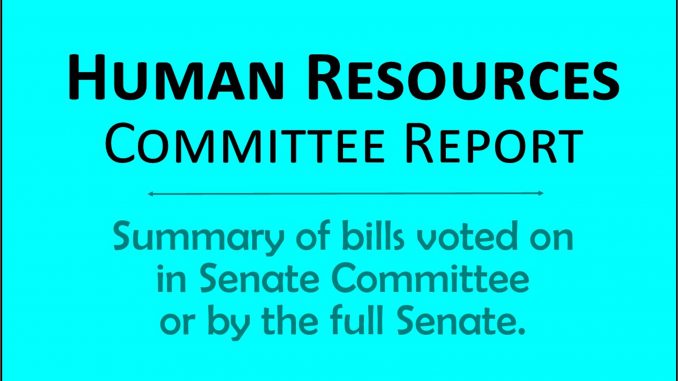
On this page
FLOOR ACTION:
HF 2269 – Medicaid Elder Waiver Cap removed
HF 2269 requires the Department of Human Services to eliminate the monthly budget maximum or cap for individuals eligible for the Medicaid home and community-based services elderly waiver. The department must track the average amount expended per waiver recipient each fiscal year beginning July 1, 2020, and report the information annually to the Governor and the Legislature by October 1.
[6/4: 49-0 (Excused: Hogg)]
COMMITTEE ACTION:
HF 2192 – Telehealth
Hf 2192 requires Iowa health carriers to reimburse a health care professional and a facility for health care services provided by telehealth on the same basis and at the same rate as would apply if the services were provided in person. This requirement would become effective on January 1, 2021. A committee amendment changed parity to 65% for medical telehealth and 95% for mental health telehealth.
[6/5: 8-5, party line]
HF 2197 – Medical Residency Grants
HF 2197 – Under current law, the medical residency training state matching grants program requires that a residency program, including federal residency positions at the University of Iowa Hospitals and Clinics, offer residents the opportunity to participate in a rural rotation to expose them to rural areas of the state. Under current law, primary care specifically includes the practice area of psychiatry. Under the bill, the specified primary care practice areas are expanded to also include obstetrics, gynecology, family medicine, internal medicine and emergency medicine.
[6/4: short form]
HF 2270 – Child Care reimbursement
Hf 2270 – Effective July 1, 2020, the Department of Human Services must set the reimbursement rates for child care providers under the state child care assistance program at the 50th percentile of the 2017 market rate survey for any provider currently under the 50th percentile. DHS also must adjust quality rating system bonuses to reflect the increased child care provider reimbursement rates as appropriate.
[6/4: short form]
HF 2485 – Number of children allowed in child care at one time
HF 2485, as amended, directs the Department of Human Services to adopt rules allowing registered child development homes providing care to school-aged children to exceed the child-to-staff ratio when a school-aged child’s school starts late, is dismissed early, is canceled due to inclement weather or structural damage, or during a public health emergency. The child must already be enrolled at the child development home, and the number of children present cannot exceed the child development home’s registration capacity.
[6/4: short form]
HF 2499 – Dispensing fees and copayments for partially dispensed RX drugs
HF 2499 – If a person authorized to dispense prescription drugs under Code chapter 155A initially dispenses a partial quantity of a 30-day supply and subsequently dispenses the remaining quantity within 30 days of the initial dispensing, the cumulative dispensing fee applicable to all partially dispensed quantities of the prescription drug must not exceed the established dispensing fee applicable, as if the total quantity prescribed had been dispensed at one time, and the cumulative copayment required for all partially dispensed quantities of the prescription drug must not exceed the established copayment applicable, as if the total quantity prescribed had been dispensed at one time.
[6/4: short form]
HF 2526 – Transfer between trusts for persons with disabilities
Hf 2526 allows any funds retained in a Medicaid Special Needs Trust or in a Supplemental Needs Trust of a beneficiary with a disability who is also a designated beneficiary of an Iowa ABLE (Achieving a Better Life Experience) savings plan trust account to be transferred to the Iowa ABLE account of the designated beneficiary.
[6/4: short form]
HF 2561 – Protections for certain potential recipients of anatomical gifts
HF 2561 prohibits a hospital, physician or other person from determining the ultimate recipient of an anatomical gift based upon a potential recipient’s disability, except to the extent that the disability has been found by a physician, following a case-by-case evaluation of potential recipients, to be medically significant to the provision of the anatomical gift.
[6/5: short form]
HF 2563 – Creating a work group relating to child fatality protocol and alleged child abuse
HF 2563 requires the Department of Human Services to convene a work group of state and local agencies that have experience and expertise in cases involving child fatalities and alleged child abuse. The work group must develop a protocol for responding to the scene of the death of a child that constitutes a death affecting the public interest, as defined in section 331.802, that may involve alleged child abuse.
[6/4: short form]
HF 2600 – Child care workforce state matching grants and fund
HF 2600 establishes a child care workforce state matching grants program and fund administered by the Early Childhood Iowa State Board to award matching state grants to eligible communities. Money appropriated to the Fund does not revert to the General Fund and is available for future fiscal years. No money is appropriated in this bill. Interest earned on the Fund is attributable to the Fund.
The bill restricts the ECI Board to using no more than 5% of all funding available at the beginning of a fiscal year for administration, marketing and other program support; directs the ECI Board to use the Program to provide dollar-for-dollar matching grants to eligible communities to provide funding for the child care WAGE$ Iowa Program, Teach Education And Compensation Helps (TEACH) Scholarship Program, or other child care workforce strategies; and requires the ECI Board and Department of Management to adopt administrative rules that implement the Program.
[6/4: short form]
